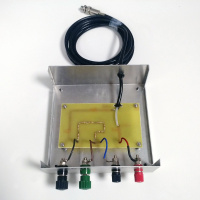Difference between revisions of "User:Jann/Sandbox/High-Voltage Probe Box"
Jump to navigation
Jump to search
(Init page for HV box) |
m (Put explanatory text above "Schematics".) |
||
| Line 15: | Line 15: | ||
;Files: [https://gitlab.com/IESL-ElectroLab Git repository] | ;Files: [https://gitlab.com/IESL-ElectroLab Git repository] | ||
| − | |||
The box takes a high-voltage input through a SHV-BNC connector with RG-58 coaxial cable, which feeds directly onto the PCB. | The box takes a high-voltage input through a SHV-BNC connector with RG-58 coaxial cable, which feeds directly onto the PCB. | ||
The "HV" output is to be connected to the two sides of a spark gap. (A real spark should never occur here, in order to avoid high voltage levels on the oscilloscope.) | The "HV" output is to be connected to the two sides of a spark gap. (A real spark should never occur here, in order to avoid high voltage levels on the oscilloscope.) | ||
The "PROBE" output is to be connected to an oscilloscope to measure the ionization of air between the contacts of the spark gap. | The "PROBE" output is to be connected to an oscilloscope to measure the ionization of air between the contacts of the spark gap. | ||
| + | == Schematics == | ||
<gallery mode=packed heights=300px> | <gallery mode=packed heights=300px> | ||
File:High-Voltage Probe Box - PCB.pdf.png|PCB layout | File:High-Voltage Probe Box - PCB.pdf.png|PCB layout | ||
</gallery> | </gallery> | ||
Latest revision as of 19:02, 24 March 2020
Dual Balanced Photodiode Driver
- Ordered by
- Tasos Koulouklidis
- Ordered on
- 2 March 2019
- Made by
- Jann Kruse, George Gousis, John Koutsaidis
- Finished on
- 12 March 2019
- Files
- Git repository
The box takes a high-voltage input through a SHV-BNC connector with RG-58 coaxial cable, which feeds directly onto the PCB. The "HV" output is to be connected to the two sides of a spark gap. (A real spark should never occur here, in order to avoid high voltage levels on the oscilloscope.) The "PROBE" output is to be connected to an oscilloscope to measure the ionization of air between the contacts of the spark gap.


